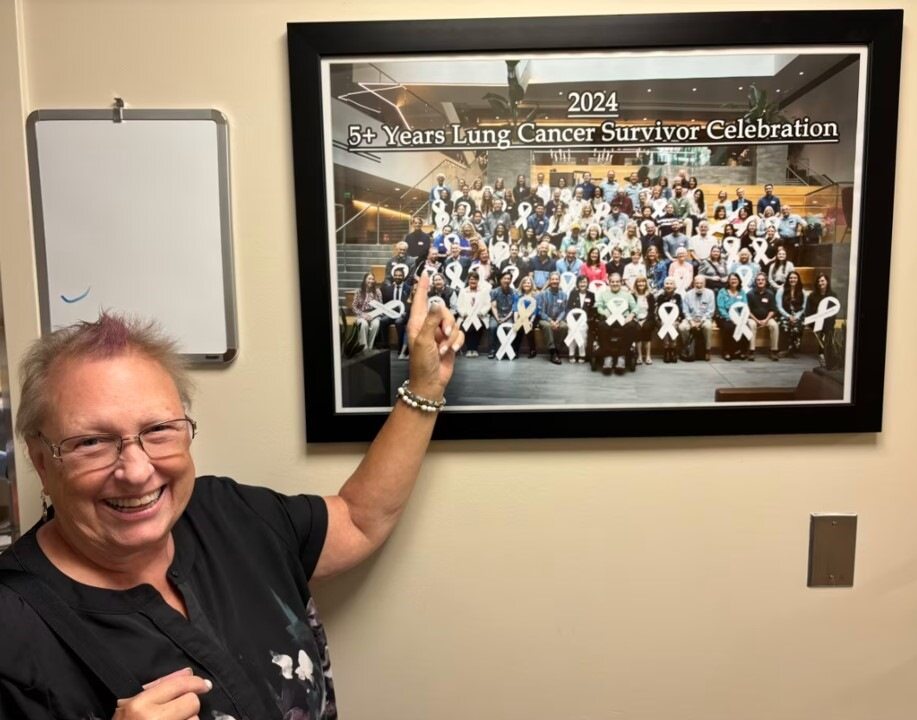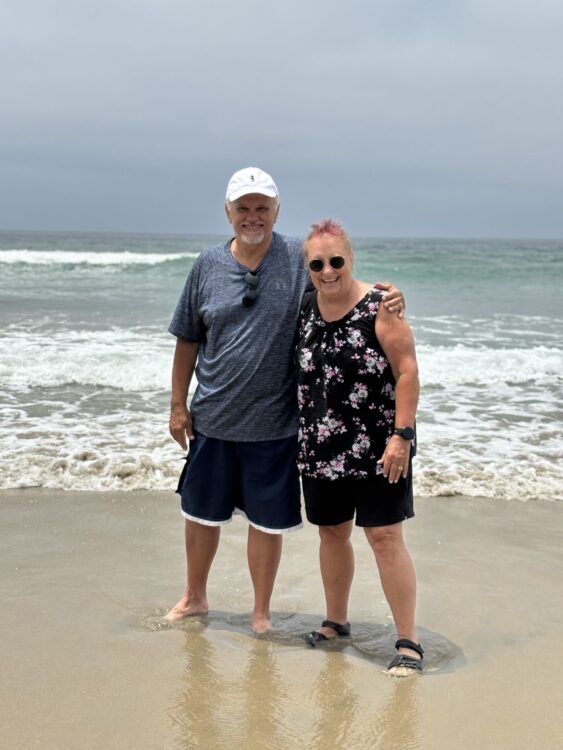If you missed part 1 of Betty and Bill’s story, read it here.
The lowest point
Bill: In 2021, Betty had a series of 3 major strokes and several smaller ones caused by the lung cancer progressing and Betty’s blood thickening when the Opdivo (nivolumab) stopped working effectively. They were devastating.
Betty: Those strokes are the thing that bothers me more than anything else to this day. They changed our life. Even with lung cancer, we had a nice life before the strokes.
Bill: The cancer was under control before that, and even with the side effects we had from the different treatments, we were managing it all. But the strokes have been far, far more impactful on our lives than the cancer has been. Betty had been essentially asymptomatic from the cancer once the chemo shrunk her initial tumors. But the strokes were a different story.
Betty: They still affect me every day. I don’t feel as much like myself anymore. For example, Bill and I played Bridge competitively for 28 years. It was something we had always done together. But I can’t really play now.
Bill: That and golf.
Betty: Yes. Bridge and golf were important parts of our life and my identity. And both of those went away. I was an athlete my whole life. I went to college on athletic scholarships. It was a big part of how I saw myself, and now it’s mostly gone. But 1 of these days, I am going to try to go to the driving range and see if I can play golf again.
Bill: You will.
Betty: I also can’t drive anymore. That’s a big thing. It’s taken my independence.
Bill: It’s been baby steps.
Betty: It’s taken years of baby steps, but as far as the athletic side of things, I started playing bocce ball, which I love. I started playing while still using a walker, and I don’t need that now. It’s been good for me to have something competitive to play again.
Bill: If you met Betty on the street today, you’d never know she had a stroke.
Betty: Yeah.

Bill: Now, if you asked her if she could give you a ride…
Betty: (laughs) …You’d find out.
A “plan B” clinical trial miracle
Bill: When Dr. Brown left, she set us up with a new thoracic oncologist.
Betty: He wasn’t a hugger.
Bill: But we didn’t really need that anymore.
Betty: No. And 1 of his nurses said that he would move mountains for his patients, and he did —particularly for me.
Bill: For example, when he was concerned that Opdivo (nivolumab) was starting to lose some effectiveness, he wanted to add another drug to her treatment. However, the drug wasn’t covered by our insurance because it wasn’t considered standard of care, and it wasn’t part of a clinical trial. It was going to cost $20,000 a month, which we couldn’t afford to take on. So, the doctor called the pharmaceutical company and got us involved with the patient assistance program, and they basically provided the drug to us for free.
Betty: But he ended up leaving, too.
Bill: Not before he got us into the clinical trial that would change everything. He also set us up with Dr. Ross Camidge, who is 1 of the best lung cancer doctors in the world.
Betty: It felt very lucky.
Bill: When we realized the Opdivo (nivolumab) wasn’t working anymore, he picked a clinical trial to try. We went through all the steps to join the trial, including Betty having a liver biopsy, which is a nasty thing. But literally a week or 2 before it was going to start, they called us and said, “Sorry, they just closed the trial.”
Betty: It’s like, oh God, now what? It was devastating.
Bill: But our doctor said, “Don’t worry, we have a plan B.” And it turns out that plan B was the Trodelvy (sacituzumab govitecan) trial. We don’t know what would have happened with the first trial, of course, but this 1…
Betty: Was perfect for me.
Bill: For most people on the trial, it showed only a little bit of improvement versus the standard of care, which is not what they would call significant improvement. But for Betty and her rare mutation, the response has been…
Betty: Amazing.
Bill: It’s like winning the lottery. We hate to brag because we don’t want to jinx ourselves, but it’s just been incredible. And do you know how many people are left in that trial today?
Betty: Just 1. Me. I’m the only 1 worldwide for lung cancer.
Our partnership
Bill: I learned pretty quickly that my role in our lung cancer includes being the eyes and the ears of our team when something scary is being shared by the care team. That way, Betty can have any reaction she wants, deal with the shock of it, and process it without also having to try to listen. 
Betty: And he can explain it all to me later. Especially after my strokes, I wasn’t really able to understand what they were talking about all the time. Bill would listen for both of us and explain it to me. He’s basically a medical guru at this point.
Bill: I’ve become somewhat of a lung cancer expert.
Betty: You’ve had to be.
Bill: Betty’s role in our team is as the emotional compass for us. As we keep saying, it’s our disease, but it is in her body. She’s the 1 that doesn’t feel good sometimes, the 1 who gets the infusions, and takes the tests. I rely on her to tell me how she’s feeling–physically and emotionally–so that I can help her to manage and help to make decisions based on that. She can tell me when she’s feeling down some days or when she’s raring to go.
Betty: And I lean on you—literally. I had a walker, and then a cane, but now I have Bill. He takes my hand all the time now when we’re out in public. He’s my cane now.
Bill: What she doesn’t know is that with my arthritic knees, I’m actually the one leaning on her.
Betty: We lean on each other.
A hopeful life
Bill: There have been different phases of this journey for us. The diagnosis phase is devastating. You’re worried about how long you will survive. We wondered if Betty would be here when our son returned from boot camp—things like that. Then the chemo starts working, the cancer is shrinking, and you move into a different phase where you start to think about enjoying the time between scans.
Betty: The scans are always scary.
Bill: Yes, but in that second phase, you sort of get used to living with cancer. You’re thinking, “Maybe we’ll get a year out of this.” You learn the language, gain some experience with what is and isn’t an emergency. Things aren’t quite as scary.
Betty: In the beginning, we were in the ER so much that we called it our Friday night date night. But now, we know a little more about what we can handle at home.
Bill: Yes, and now we’re in this new, third phase where we’ve been on this trial for so long that we’re talking with Dr. Camidge about long-term disease management and long-term survival with a stage 4 (IV) diagnosis. It’s really incredible, and it was unthinkable at the beginning. We get to think about the future again now.
Betty: We have a lot of hope now. It’s what keeps me going.
Bill: Hope is also motivational because it helps you make your own good luck. You need some hope to get up and keep pursuing a new treatment or fight to feel better.
Betty: I feel so hopeful, but I also feel realistic. The hardest questions people ask me are, “Are you in remission?” or “When will you be in remission?” I have to say, “Well, never. I’m just going to be in treatment until it doesn’t work anymore.” I asked Dr. Camidge, “What should I say to people?” He said, “Tell them you’re stable.” So, stable is my new word. And I have a lot of hope that I will be stable for a long time.
Bill: Experience tells us that the treatment she’s on now might not work forever. But hope tells us there will be something else to try if that happens. We’ve always asked Dr. Camidge if he has a treatment in his back pocket for us if we need it, and the answer has always been yes. So that gives us hope, too.
Betty: In the meantime, I’m focusing on staying stable. Stable is a good thing.
If you have been diagnosed with lung cancer, you are not alone. Contact our HelpLine for free one-on-one support, treatment and trial information, referrals, and more. Call 1-800-298-2436 or email support@go2.org today.

Leave A Comment